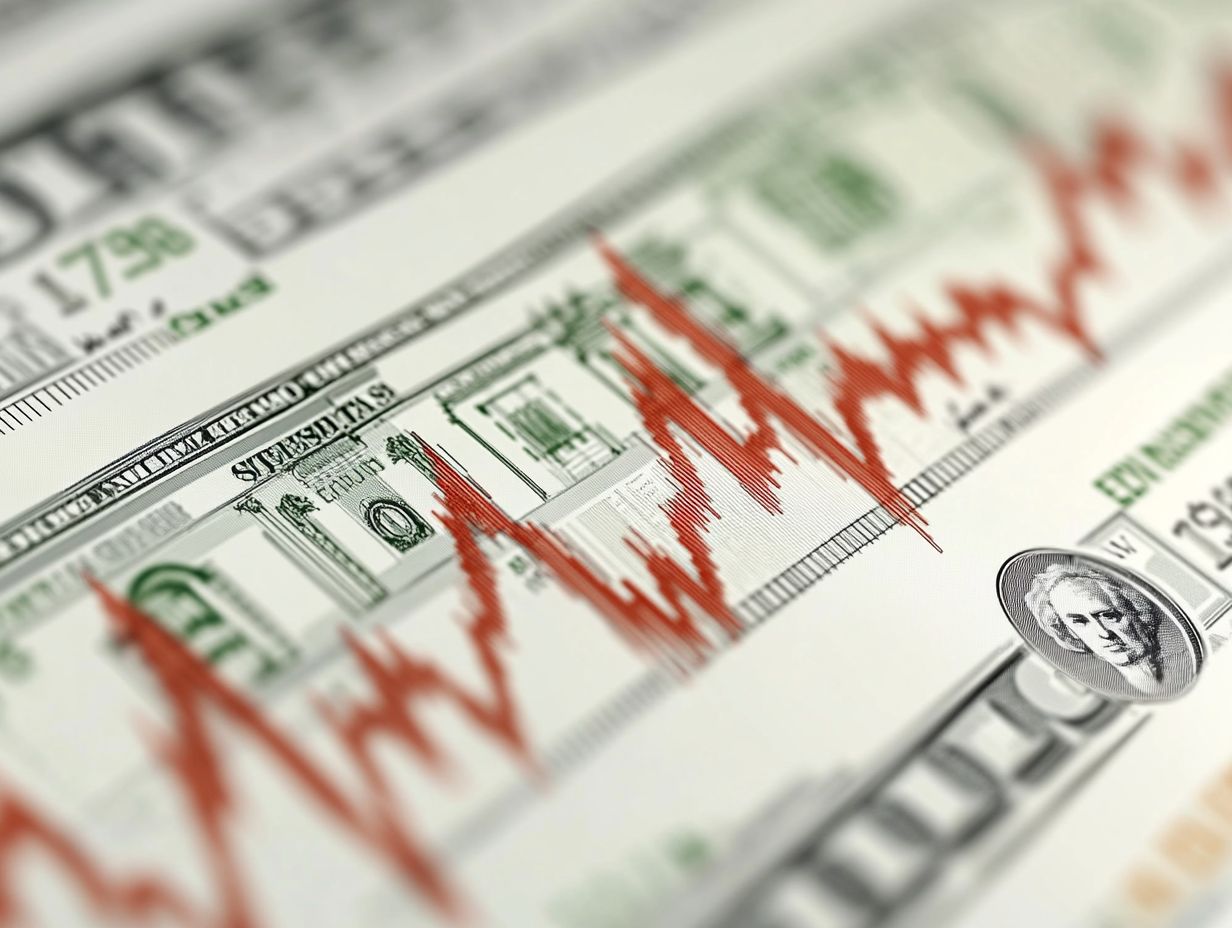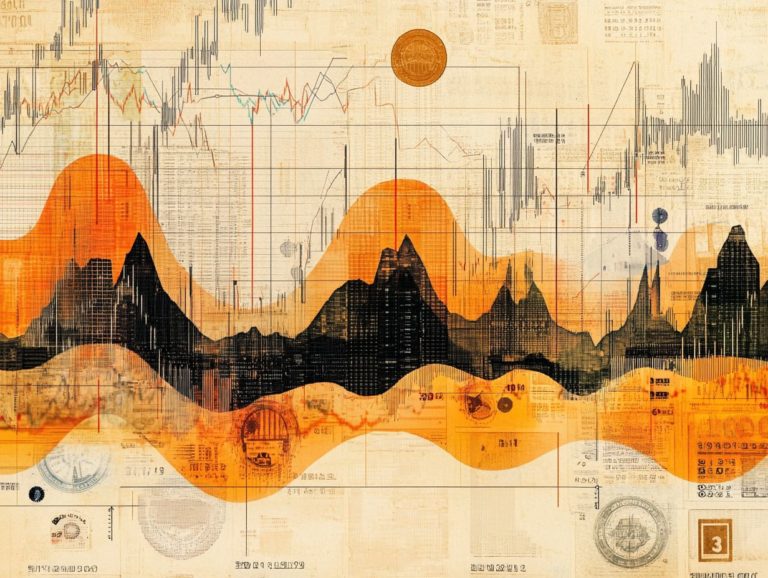How Inflation Affects Market Trends
Inflation isn’t just a buzzword; it plays a profound role in shaping your economy and daily life.
By grasping its definition and the factors that drive it, you’ll see how inflation impacts consumer behavior and business decisions. This significantly influences market trends.
This article will lead you through the intricate relationship between inflation and stock market performance, providing a thorough analysis of historical data and future predictions.
You ll also discover practical strategies to navigate the challenges of inflation, tailored for both individuals and policymakers.
Stay with us to discover vital strategies that will help you thrive in today’s inflationary landscape!
Contents
- Key Takeaways:
- Understanding Inflation
- Impact of Inflation on Market Trends
- Inflation and Stock Market Performance
- Strategies for Dealing with Inflation
- Frequently Asked Questions
- Want to know how inflation shapes market trends? Here s what you need to understand!
- What are the main ways that inflation impacts the stock market?
- Can inflation have a positive effect on market trends?
- How can investors protect their portfolios from the effects of inflation?
- How do international factors impact the relationship between inflation and market trends?
- How can inflation affect different sectors of the stock market differently?
Key Takeaways:

- Inflation can cause changes in consumer behavior, such as decreased spending and increased saving, leading to fluctuations in market trends.
- Businesses and investors must consider the impact of inflation on the cost of goods, interest rates, and overall market stability when making financial decisions.
- Historically, inflation has had both positive and negative effects on the stock market, making it important for investors to carefully monitor and adapt to inflation trends.
Understanding Inflation
Understanding inflation is essential for you as an investor or market participant, as it profoundly impacts purchasing power, interest rates, and overall economic growth.
Inflation signifies the persistent increase in the price levels of goods and services over time, which can diminish real income and prompt changes in monetary policy. Monetary policy refers to how central banks manage the economy by controlling the money supply and interest rates.
You should take inflation expectations into account when crafting your investment strategies. This will help you effectively navigate fluctuating market conditions and ensure a steady cash flow.
This intricate economic phenomenon is pivotal in shaping the financial landscape and influencing investment portfolios, compelling you to adapt to the ever-evolving economic environment.
Definition and Causes
Inflation is the rate at which the general level of prices for goods and services rises, gradually eroding your purchasing power and impacting overall economic stability.
This phenomenon can take on various forms, most notably demand-pull and cost-push inflation, each originating from different sources.
Demand-pull inflation often occurs when consumer spending spikes, outpacing supply and prompting businesses to raise prices. On the other hand, cost-push inflation arises when rising production costs like labor wages or raw material expenses compel companies to increase their prices.
Key factors that further influence inflation include the monetary policy decisions made by central banks, which may adjust interest rates to manage the money supply. External economic pressures, such as geopolitical events or trade agreements, can also disrupt supply chains and lead to price increases.
Impact of Inflation on Market Trends
The impact of inflation on market trends is significant, influencing your consumer spending habits, interest rates, and the overall stability of the economy, as detailed in how market trends influence investment strategies.
This complex interplay can lead to surprising market swings that every investor should watch closely!
Understanding these dynamics is crucial for making informed decisions in an ever-changing financial landscape.
Effects on Consumer Behavior

Inflation profoundly transforms your behavior as a consumer by eroding your purchasing power and shaping your spending habits in response to fluctuating price levels.
As prices climb, uncertainty about your financial stability often sets in. This prompts a careful reexamination of your budget.
You may find yourself prioritizing essential goods over non-essentials, making tough choices about what truly matters. This shift tends to dampen overall consumer confidence, influencing your willingness to make larger purchases or indulge in discretionary items.
With inflation persisting, your real income takes a hit, which means you might struggle to maintain your previous consumption levels. This, in turn, can adversely affect the businesses that depend on steady sales.
It s crucial for market participants to recognize these dynamics, as changes in your spending habits can indicate broader economic trends and the overall health of the market.
Effects on Business and Investment
Inflation carries significant implications for your business and investment landscape. It drives up costs, influences corporate earnings, and prompts necessary adjustments in your investment strategies.
As expenses rise, you may find yourself reassessing your pricing models. You will need to decide whether to pass those costs along to consumers or implement cost-saving strategies to cushion the impact. This decision doesn’t just affect your bottom line; it sends ripples through various industries, altering consumer behavior and shifting investment sentiments.
For investors, understanding how different firms respond to inflation is pivotal for shaping your portfolio decisions. Whether you re considering stocks, bonds, or real estate, each asset class reacts uniquely to inflationary pressures. In this ever-changing environment, trading platforms must evolve, providing tailored solutions for a climate where price stability is increasingly a luxury.
Inflation and Stock Market Performance
The relationship between inflation and stock market performance is intricate. Inflationary pressures can cause equity prices to fluctuate, impacting both established companies and emerging growth stocks alike.
Understanding this dynamic is essential for navigating the investment landscape effectively.
Historical Trends and Predictions
Historical trends reveal that inflation consistently shapes stock market performance. It impacts growth stocks, value stocks, and overall market volatility in different ways.
Consider how significant inflationary periods like the oil crisis of the 1970s and the hyperinflation of the early 1980s transformed investor strategies and expectations. During those turbulent times, many market participants gravitated towards value stocks, drawn by their perceived stability and reliable dividends. In contrast, growth stocks often faced intense scrutiny as rising costs began to squeeze margins and cloud future earnings potential.
Looking ahead, current economic indicators suggest we might be on the brink of another inflationary phase, driven by stimulus measures and supply chain constraints. As monetary policy shifts to address these challenges, stay alert! Monitoring inflation rates and the Federal Reserve’s responses could be the key to your investment success.
Strategies for Dealing with Inflation

Developing effective strategies to navigate inflation is crucial for safeguarding your investment portfolio, enhancing your cash flow, and preserving your wealth during inflationary periods.
By proactively addressing these challenges, you can ensure your financial stability and make informed decisions that stand the test of economic fluctuations.
Investment and Savings Strategies
Investment and savings strategies are essential in mitigating the adverse effects of inflation. They ensure you achieve long-term investment growth and preserve your wealth.
As you navigate the complexities of an ever-fluctuating economy, consider using real estate investment trusts (REITs) as a strategy. These can be a savvy choice, as they often appreciate in value alongside rising prices. You might also think about diversifying your portfolio with commodities like gold or oil, which have historically served as safe havens during inflationary periods.
While embracing aggressive investment strategies is important, maintaining a balanced approach that includes high-yield savings accounts and fixed-income securities can further protect your purchasing power. This blend provides the stability you need amid economic uncertainty. By combining these strategies, you create a robust framework designed to withstand the challenges posed by inflation.
Government Policies and Interventions
Government policies and interventions, especially the monetary policy enacted by the Federal Reserve, play a pivotal role in managing inflation and its effects on the economy.
By carefully adjusting interest rates, authorities seek to influence spending and investment behaviors. Lowering rates encourages borrowing and spending, which can ignite economic growth. Conversely, raising rates typically aims to temper an overheating economy.
Fiscal stimulus measures government actions aimed at boosting economic activity, like increased spending or tax cuts are designed to boost total demand for goods and services, particularly during economic downturns.
However, these interventions are not without risks. If not executed with precision, they could lead to market volatility or worsen inflationary pressures, presenting delicate challenges for policymakers.
Frequently Asked Questions
Want to know how inflation shapes market trends? Here s what you need to understand!

Inflation significantly impacts market trends. For instance, the impact of interest rates on market trends shows that high inflation rates lead people to spend less, decreasing demand for goods and services.
What are the main ways that inflation impacts the stock market?
Inflation can impact the stock market in several ways, including changes in interest rates, consumer spending, and company earnings. When inflation is high, central banks may raise interest rates, making it more expensive for companies to borrow money. This can potentially decrease profitability.
Consumers may have less disposable income, which lowers demand for products and services. This, in turn, can affect company earnings and stock prices.
Can inflation have a positive effect on market trends?
In some cases, moderate inflation can actually have a positive effect on market trends. Low and stable inflation can indicate a healthy economy, stimulating consumer spending and business growth.
This can lead to increased demand for goods and services, resulting in higher profits for companies and a bullish trend in the market.
How can investors protect their portfolios from the effects of inflation?
One way investors can protect their portfolios from inflation is by diversifying their investments. Spreading money across different asset classes, such as stocks, bonds, and real estate, minimizes risk.
Investing in assets directly affected by inflation, such as commodities, can also provide a hedge against rising prices.
How do international factors impact the relationship between inflation and market trends?
Inflation can be influenced by global economic factors, such as changes in exchange rates and trade policies. For example, a sudden increase in the cost of imported goods can lead to higher inflation rates.
This can affect market trends, especially in countries that rely heavily on imports or exports.
How can inflation affect different sectors of the stock market differently?
Different sectors of the stock market can be affected differently by inflation. Companies in the technology sector may be less impacted by inflation than those in the consumer staples sector.
Tech companies often have higher profit margins and may be better equipped to absorb rising costs. In contrast, consumer staples companies those producing essential goods may struggle to maintain profitability during high inflation, leading to declines in stock prices.






